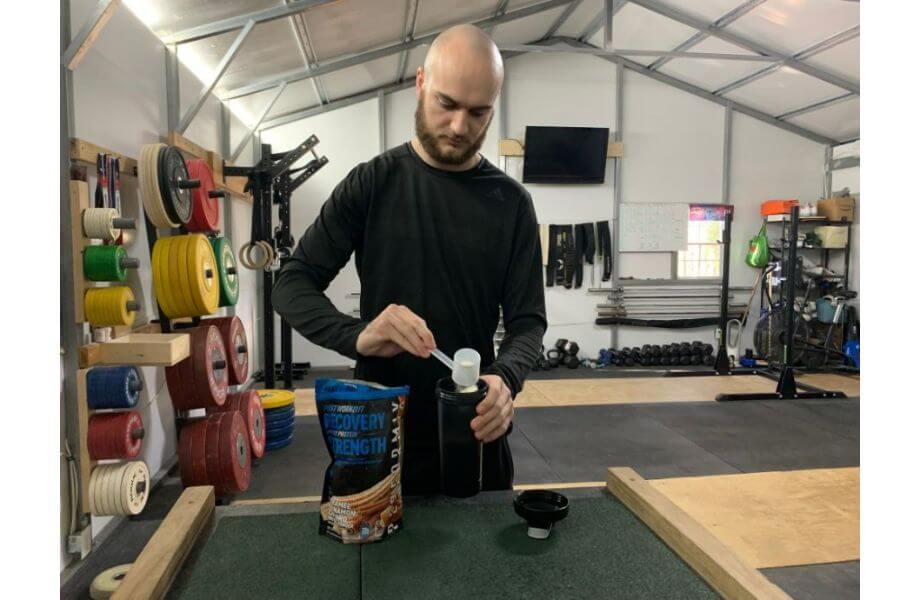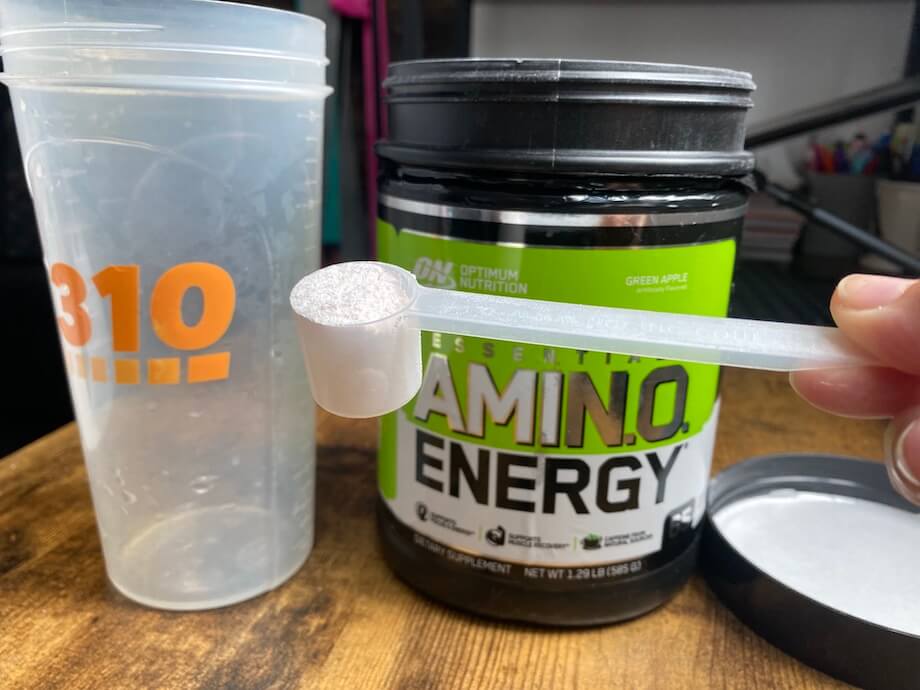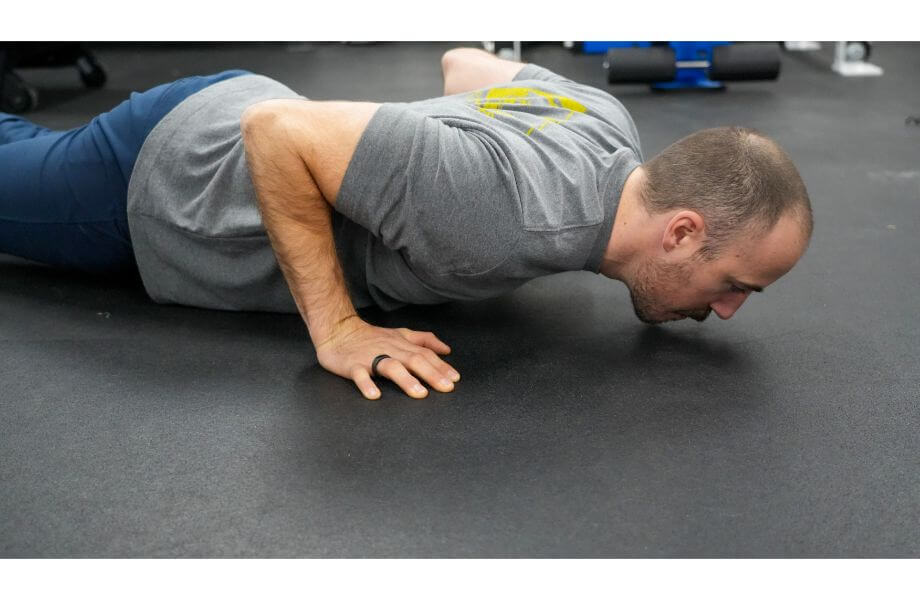We know that protein is essential for recovery, as it supplies the essential amino acids your body needs and for decades, fitness enthusiasts have relied on protein powders to help them recover from workouts and get those sweet, sweet muscle gains.
But is protein powder all it’s cracked up to be? Research suggests that whole foods can work just as well as protein powder1, so why are gym-goers rushing to chug some a protein shake the minute they finish a workout? It comes down to convenience.
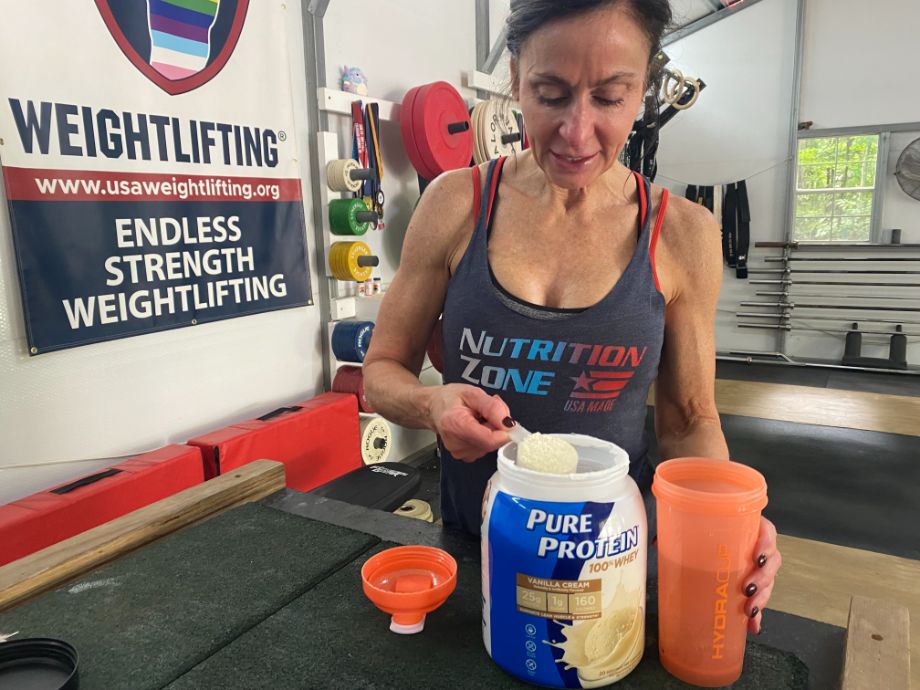
While not technically necessary, using protein powder for recovery is a great idea for anyone who’s looking to optimize muscle growth after workouts without having to wolf down a large portion of chicken and rice in the gym parking lot. In this guide, I’ll break down the benefits of using protein powder, the different types of protein you can use for your goals, and plenty more.
Real Guides from Certified Nutrition Coaches
As a former personal trainer and Precision Nutrition Level 1 coach, I’ve spent over a decade helping clients improve their nutrition to maximize their results. For this guide, I also spoke with Destini Moody, a registered dietitian and the head of performance nutrition for the NBA G League Ignite.
We’ve both kept a close eye on nutrition research over the years and are here to bring you the latest information about protein powder for recovery.
Protein and Recovery
Before I get into the benefits of using protein powder, let’s review how protein improves recovery.
Protein is one of the big three macronutrients, along with carbohydrates and fats. While carbs fuel your high-intensity exercise, a high-quality protein provides the amino acids used for muscle recovery. Carbohydrates are stored as glycogen, and post-workout carbs help replenish glycogen stores, but protein supplies the amino acids your body needs for post-workout recovery and muscle growth.
How does this work?
Well, your skeletal muscles are made of amino acids, which are the building blocks of muscle tissue. Resistance training stimulates a process called muscle protein synthesis, which is the process of building new muscle tissue that requires amino acids.
RELATED: What is Resistance Training?
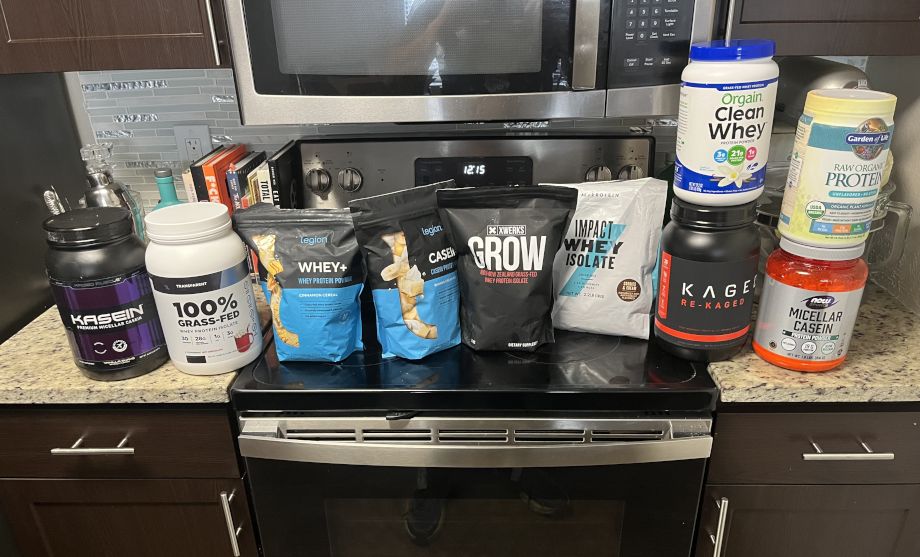
For recovery, you want a complete protein source, which is a protein that contains all nine essential amino acids that your body can’t manufacture itself and needs to obtain from food. That’s why whey protein is often considered the best recovery protein, as it’s high in the essential amino acids that can promote recovery and reduce soreness.
In particular, whey protein is high in leucine, a branched-chain amino acid (BCAA) that triggers muscle protein synthesis2.
Whey is also rich in glutamine, as well as the other two BCAAs, isoleucine and valine, but leucine plays the biggest role in muscle protein synthesis. That’s why whey protein is a popular choice, and research shows that whey protein improves recovery after resistance training3.
RELATED: Best Whey Protein
Another important benefit to call out here is that protein intake may also prevent muscle loss when dieting. Losing lean muscle mass is the last thing any of us want and a common concern when dieting.
Luckily, studies show that a high protein intake can prevent muscle loss when in a calorie-restricted diet4, making it a useful strategy when losing weight.
Whole Foods vs. Protein Powder
Given that the benefits come from all complete proteins, including animal protein sources like meat, fish, eggs, and dairy, along with some plant-based sources, why would someone choose protein powder over whole foods?
While it’s true that adequate protein from any source, including whole foods, is important to improve recovery, protein powder is an easy way to increase your protein intake without having to eat more solid food.
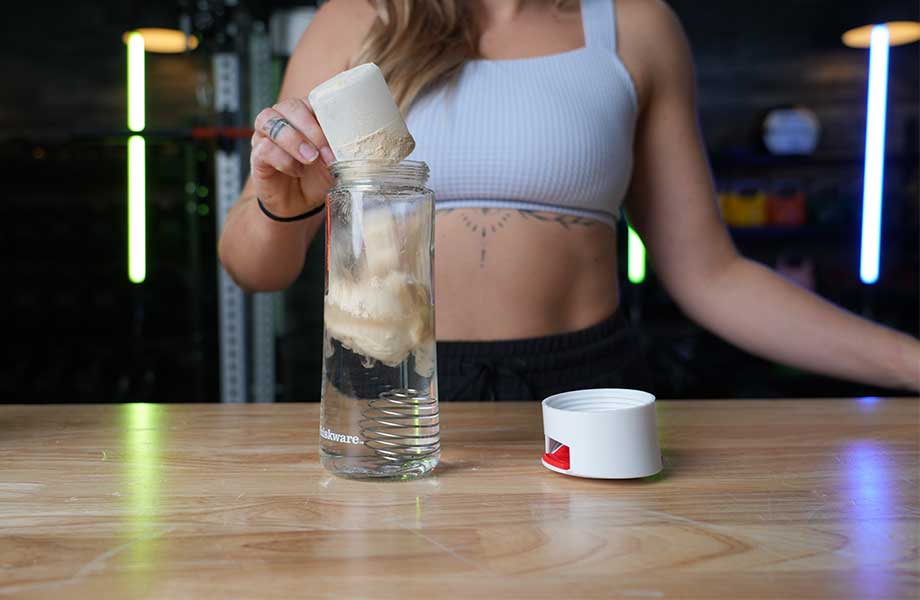
Destini Moody, RD, says that she always recommends that people get their protein from a combination of plant and high-protein food sources, but believes protein powder can be a useful supplement for those with very high protein needs who have a hard time eating enough solid protein.
Protein powder should supplement your diet but not replace your whole-food protein sources. Whole food sources are generally more filling than liquid, and I’ve had many clients tell me that they get hungry during the day if they primarily use protein powder instead of whole food.
It’s best to eat real food throughout the day, and use protein powder to boost your overall protein intake as needed.
RELATED: What to Look For in Protein Powder
When Should You Use Protein Powder?
If you’re looking to boost your daily protein intake, you can use protein powder at any time of the day. Have it as a snack, use it for smoothies, or mix it into other foods like oatmeal or yogurt—get creative.
RELATED: How Much Protein is in Oatmeal?
Are you under the impression that you need to use protein powder right after a workout to boost recovery? That’s partly because of the belief in the post-workout anabolic window within the fitness community. Meaning, if you didn’t get in your protein within two hours of finishing your workout, you’d miss out on your opportunity to build muscle. Thankfully, research shows this isn’t the case5, and your total protein intake over the day matters more than the precise timing.
However, this doesn’t mean post-workout protein is useless.
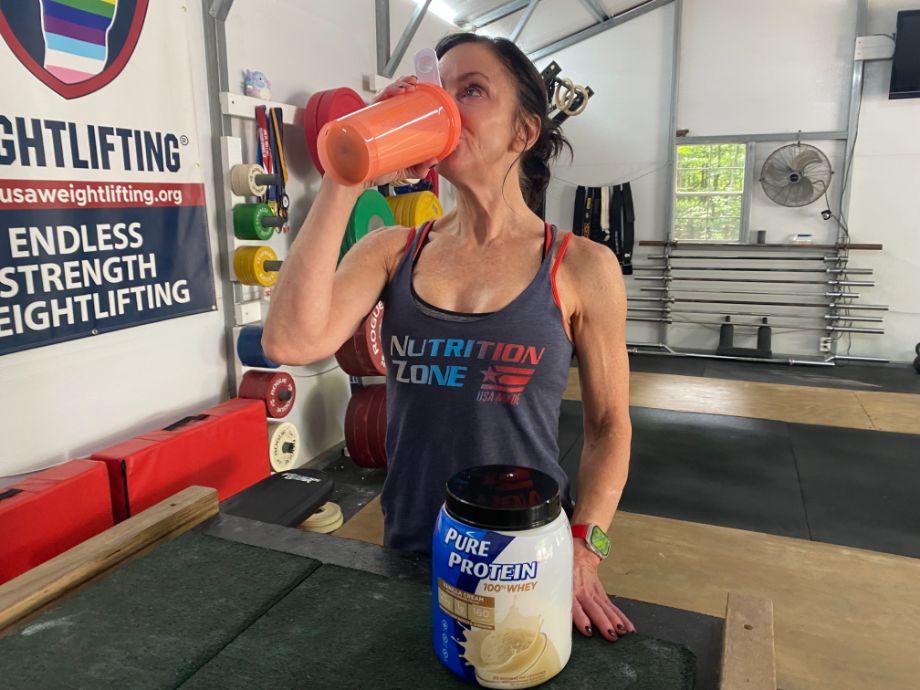
Destini adds: “I still advise athletes to have a whey protein shake post-workout if possible for two reasons: 1) whey is still one of the fastest digesting sources of protein out there, so there’s no harm in flooding your system with those amino acids quickly if it’s not inconvenient and 2) there’s still more research to be made before we formally change recommendations, so if you can both meet your daily protein needs AND get your recovery shake in quickly, there’s literally no downside.”
You may not need a protein shake right after your workout, but it certainly doesn’t hurt.
RELATED: When to Take Protein Powder
What Type of Protein Powder is Best After a Workout?
When choosing a protein powder to boost your recovery, you’re probably going to be using the protein powder after your workout. Many opt for a fast-digesting, complete protein powder, like a whey protein isolate powder, which can be easily mixed with water in a shaker cup.
RELATED: Whey Protein Isolate vs Concentrate
Casein protein powder is meant to digest very slowly, so it may seem like casein isn’t a good choice for a post-workout shake. However, research shows that both whey and casein are effective6 when used post-workout. Even plant-based protein powders can promote muscle growth and recovery7 after a workout.
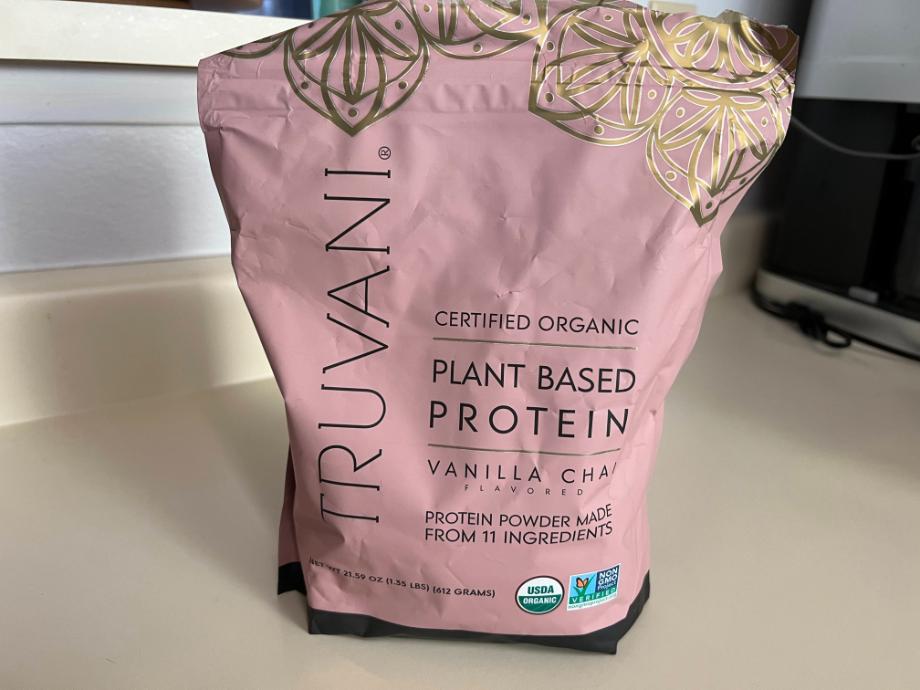
If you have a sensitive stomach, you may need to choose a gluten-free, lactose-free protein powder, like one of the best vegan protein powders, or find a protein powder with added digestive enzymes.
RELATED: Best Protein Powder for Sensitive Stomachs
As long as you’re getting enough protein, the exact type doesn’t matter, so the best protein for you is the one you enjoy the most.
How to Choose a Protein Powder
Since any type of protein can work well for recovery, you can choose from whey, casein, or plant-based protein based on your preferences.
Some prefer to use grass-fed whey protein powder, some want to avoid artificial sweeteners, while others are mostly concerned about a great taste and affordable cost. All kinds of preferences can come into play, and there is no shortage of options on the market.
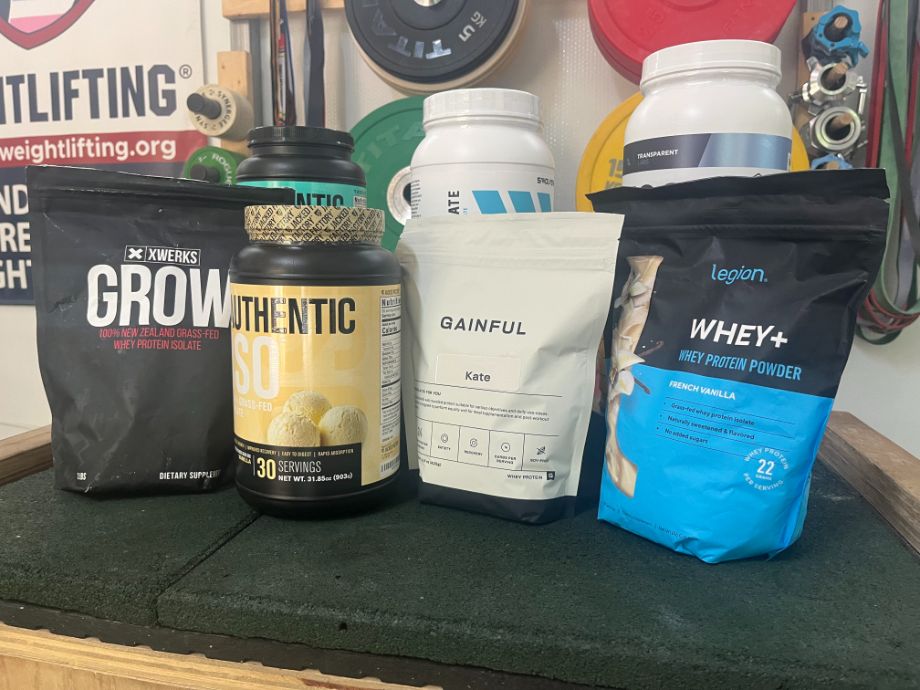
It’s also worth noting that if cost is a factor, many protein powders allow you to set up a “subscribe & save” option at checkout, which offers a lower price than a one-time purchase if you set up automatic monthly billing. You can also find protein powders on Amazon that may be on sale or offer free shipping.
Want our recommendations? In our guide to the 14 best protein powders, we’ve picked the best of the best, like Legion Whey+, which we awarded the best clean protein powder, as well as our picks for the best-tasting protein, best plant-based protein, and more.
How Much Protein Do You Need?
While old-school fitness magazines and bodybuilders may preach that you need at least one gram of protein per pound of body weight, if not much more, you can probably get away with less. Let’s look at how much protein you really need for the best results on your fitness journey.
The recommended dietary allowance (RDA) is 0.8 grams of protein per kilogram of total body weight8. However, this is the minimum amount needed to support basic functions in the body, not the optimal amount for recovery.
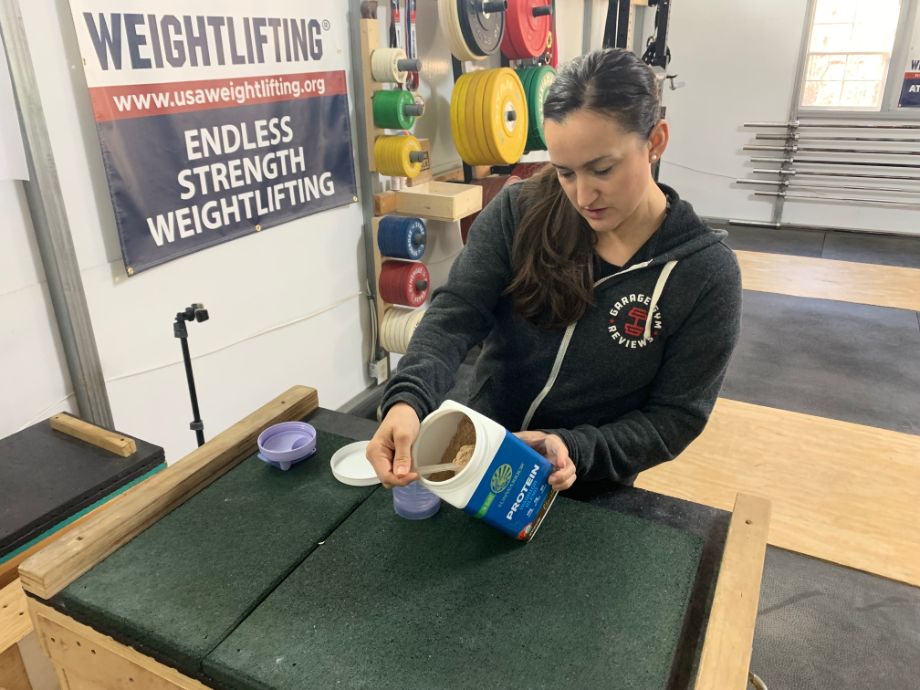
To maximize your performance and recovery, many organizations recommend using at least 1.2 to 1.6 grams per kilogram9 of body weight. If this number seems hard to reach from solid foods, protein powder can help boost your intake with a quick shake.
If you’re confused by grams per kilogram of body weight, you can divide your body weight in pounds by 2.2 to find your weight in kilograms and multiply that number by 1.2 to 1.6 to find your optimal protein range.
Protein Powder for Recovery: Final Thoughts
While protein powder technically isn’t necessary, as you can get plenty of protein from whole foods, it’s still a very convenient, easy way to boost your protein intake. We’re huge fans of protein powder here at GGR, and most of us consume it nearly every day.
You can use protein powder during the day to boost your daily intake or have a shake after your training sessions to aid your recovery. Whey and casein proteins have all of the essential amino acids your body needs, as will the best plant-based protein powders, and they all help with recovery and muscle growth.
Note that many plant-based powders are incomplete protein sources, so be sure to choose a complete protein source, like pea protein. Other plant-based formulas blend several types of plant protein powders to create a complete plant protein, which will also work well.
And if you don’t like protein powders, that’s okay. It may be a little more difficult or time-consuming, but you can get everything you need from whole-food protein sources.
Protein Powder for Recovery: FAQs
Is protein powder necessary for recovery?
No, according to recent studies protein powder is not necessary for recovery. As long as you’re getting enough protein into your diet from whole foods during the day, you’ll still recover well. Protein powder is a useful tool to increase your daily protein if you struggle to eat enough solid food.
Should I take protein powder on rest days?
You certainly can! Protein powder can be used at any time, as it’s a form of dairy that’s high in protein. While it’s often used as a recovery drink, whey protein is a great product with many uses regardless of the time of day.
Is protein or creatine better for recovery?
When it comes to recovery, protein is likely a better choice. Creatine is primarily used to increase strength and power output, while protein powder provides the amino acids your body needs to recover. Both are helpful for muscle mass, but protein is the better choice if you’re looking to improve recovery. Creatine is not a complete source of amino acids, though many lifters combine protein and creatine to maximize their results.
RELATED: Creatine Vs Whey
Is it OK to have whey protein every day?
Whey protein is generally considered to be a safe supplement, although if you have issues with dairy or health conditions like kidney disease, be sure to check with your doctor first. Research10 shows that consuming whey protein is a safe way to improve performance and recovery, but some users do experience side effects.
References
- Samal JRK, Samal IR. Protein Supplements: Pros and Cons. J Diet Suppl. 2018;15(3):365-371. doi:10.1080/19390211.2017.1353567
- Garlick PJ. The role of leucine in the regulation of protein metabolism. J Nutr. 2005;135(6 Suppl):1553S-6S. doi:10.1093/jn/135.6.1553S
- West DWD, Abou Sawan S, Mazzulla M, Williamson E, Moore DR. Whey Protein Supplementation Enhances Whole Body Protein Metabolism and Performance Recovery after Resistance Exercise: A Double-Blind Crossover Study. Nutrients. 2017;9(7):735. Published 2017 Jul 11. doi:10.3390/nu9070735
- Moon J, Koh G. Clinical Evidence and Mechanisms of High-Protein Diet-Induced Weight Loss. J Obes Metab Syndr. 2020;29(3):166-173. doi:10.7570/jomes20028
- Arent SM, Cintineo HP, McFadden BA, Chandler AJ, Arent MA. Nutrient Timing: A Garage Door of Opportunity?. Nutrients. 2020;12(7):1948. Published 2020 Jun 30. doi:10.3390/nu12071948
- Wilborn CD, Taylor LW, Outlaw J, et al. The Effects of Pre- and Post-Exercise Whey vs. Casein Protein Consumption on Body Composition and Performance Measures in Collegiate Female Athletes. J Sports Sci Med. 2013;12(1):74-79. Published 2013 Mar 1.
- Hevia-Larraín V, Gualano B, Longobardi I, et al. High-Protein Plant-Based Diet Versus a Protein-Matched Omnivorous Diet to Support Resistance Training Adaptations: A Comparison Between Habitual Vegans and Omnivores. Sports Med. 2021;51(6):1317-1330. doi:10.1007/s40279-021-01434-9
- Hudson JL, Wang Y, Bergia Iii RE, Campbell WW. Protein Intake Greater than the RDA Differentially Influences Whole-Body Lean Mass Responses to Purposeful Catabolic and Anabolic Stressors: A Systematic Review and Meta-analysis. Adv Nutr. 2020;11(3):548-558. doi:10.1093/advances/nmz106
- Carbone JW, Pasiakos SM. Dietary Protein and Muscle Mass: Translating Science to Application and Health Benefit. Nutrients. 2019;11(5):1136. Published 2019 May 22. doi:10.3390/nu11051136
- Lam FC, Bukhsh A, Rehman H, et al. Efficacy and Safety of Whey Protein Supplements on Vital Sign and Physical Performance Among Athletes: A Network Meta-Analysis. Front Pharmacol. 2019;10:317. Published 2019 Apr 24. doi:10.3389/fphar.2019.00317


